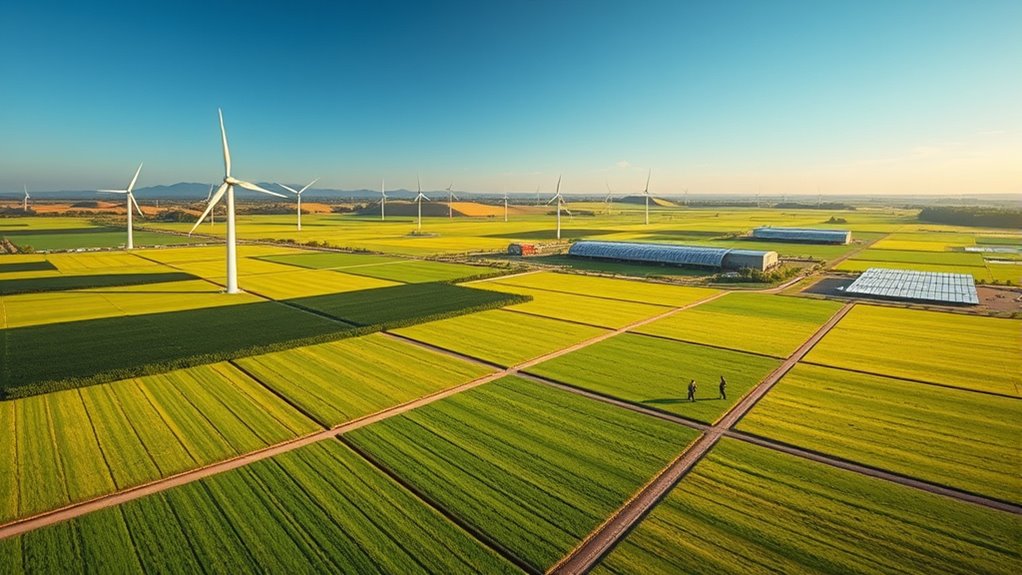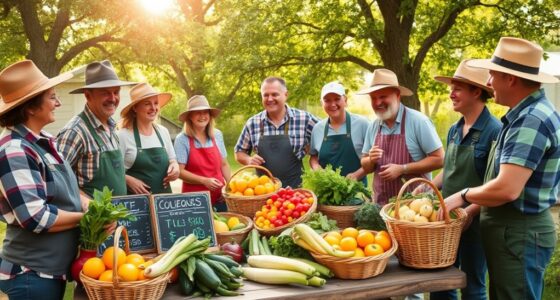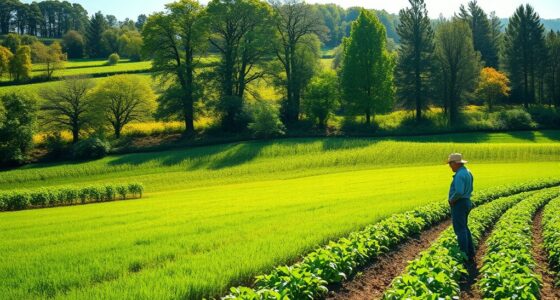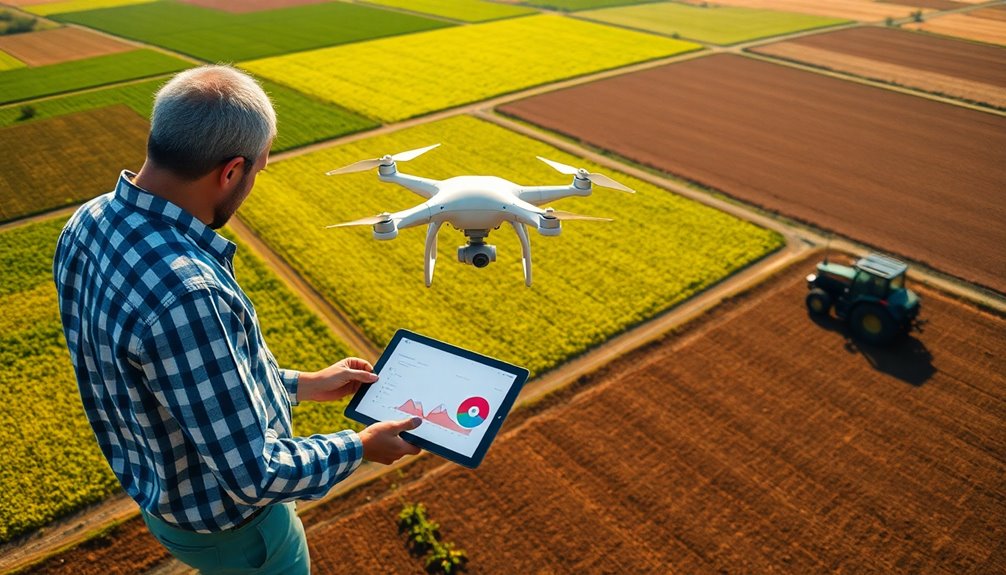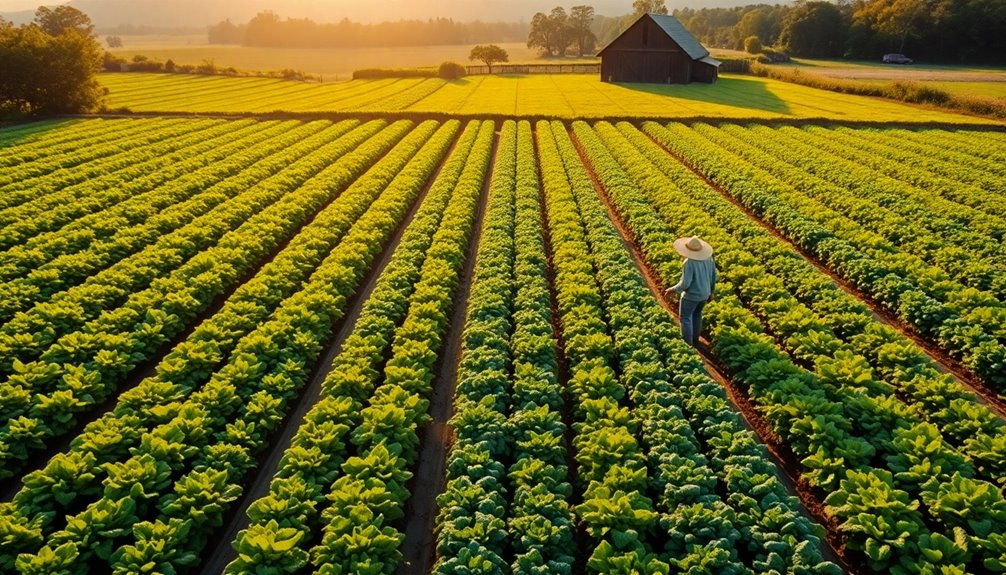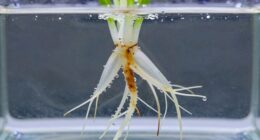The EU’s vision for agriculture and food in 2040 focuses on creating a sustainable, resilient system that balances boosting productivity with protecting the environment. It encourages sustainable farming practices, technological innovation, resource efficiency, and vibrant rural communities. The plan also emphasizes international cooperation, supporting farmers, reducing emissions, and ensuring food security for future generations. If you’re curious, you’ll discover how these strategies aim to shape a balanced, future-proof food system across Europe.
Key Takeaways
- The EU aims to develop a sustainable, resilient agricultural system balancing productivity with environmental protection by 2040.
- Focus on reducing emissions, promoting biodiversity, and supporting farmers through innovation and eco-friendly practices.
- Strengthen rural communities via infrastructure, digital connectivity, diversification, and local entrepreneurship.
- Emphasize technological innovation, precision farming, circular economy, and waste reduction to increase efficiency.
- Foster international cooperation, knowledge sharing, and policies aligned to enhance resilience and global food security.
The EU’s Strategic Objectives for 2040
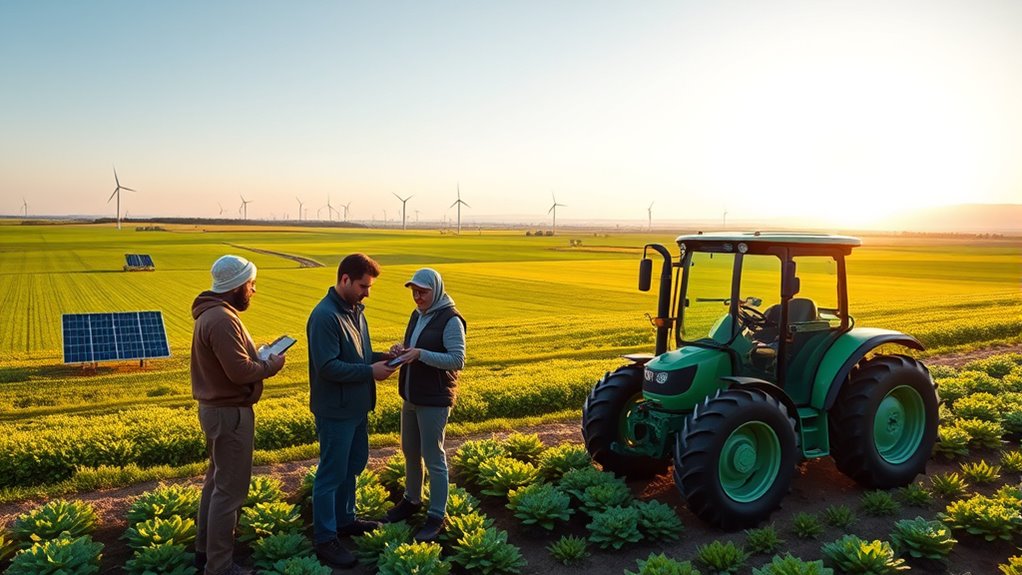
By 2040, the EU aims to create a sustainable and resilient agricultural system that balances productivity with environmental protection. You’ll see policies focusing on reducing greenhouse gas emissions and promoting biodiversity. The goal is to support farmers in adopting innovative practices that increase efficiency while safeguarding natural resources. Strengthening rural communities and ensuring fair income for farmers are also key objectives. You’ll find a shift towards digitalization and smart technologies to improve farm management and supply chains. The EU wants to enhance food security by diversifying crops and reducing dependency on imports. Moreover, the increasing integration of electric bikes and related technologies can support the sustainable development of rural areas by promoting eco-friendly transportation options. Overall, these strategic objectives aim to make European agriculture more sustainable, competitive, and adaptable to future challenges, ensuring a healthy and thriving food system for generations to come.
Embracing Sustainable Farming Practices
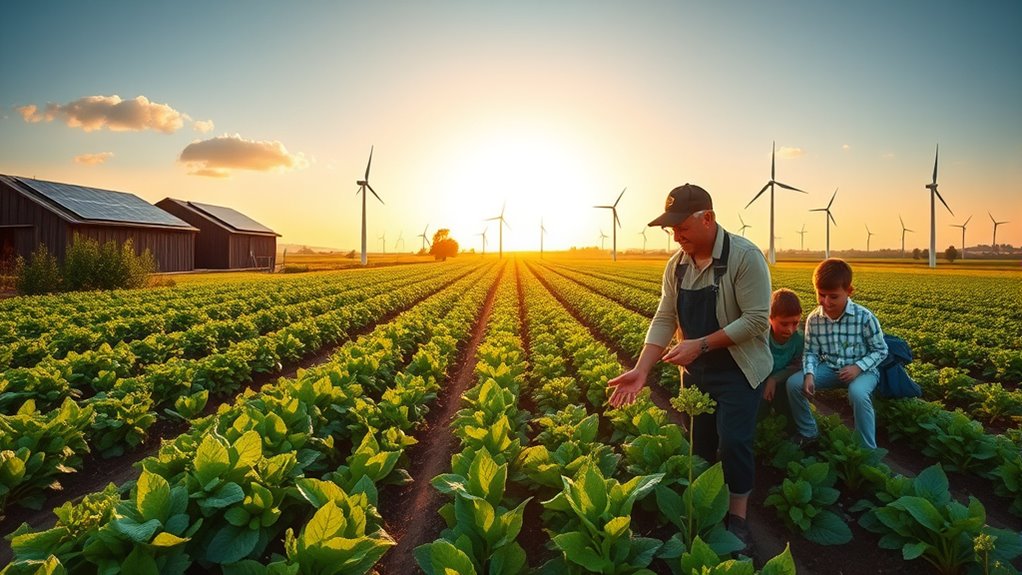
Embracing sustainable farming practices is essential for building a resilient and environmentally friendly agriculture system. By adopting methods that protect natural resources, you help guarantee food security for future generations. You can reduce your carbon footprint, improve soil health, and promote biodiversity through smarter land management. Implement crop rotation, integrate cover crops, and minimize chemical use to enhance sustainability. Focus on water conservation techniques and waste reduction strategies to boost efficiency. Supporting local markets and organic practices can also strengthen community resilience. Additionally, incorporating beach town insights can inspire innovative approaches to sustainable land use and community engagement. These steps not only benefit the environment but also make your farming operation more profitable in the long run. Embracing sustainability today paves the way for a healthier, more productive agricultural future.
Advancing Technological Innovation in Agriculture
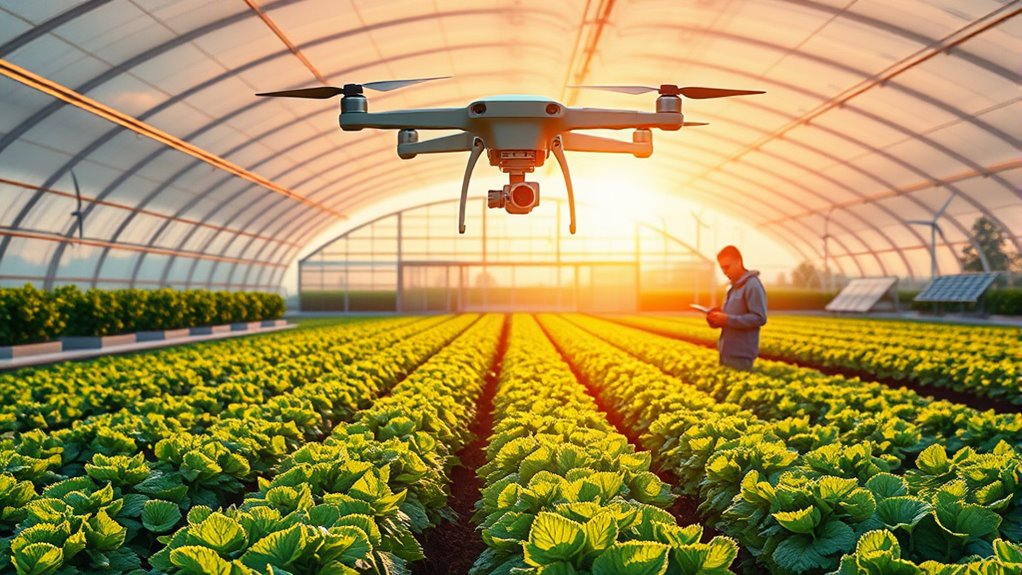
Technological innovation is transforming agriculture at a rapid pace, offering farmers powerful tools to increase productivity and sustainability. You now have access to precision agriculture technologies like GPS-guided machinery, drones, and sensor networks that optimize resource use. These tools help you monitor crop health, soil conditions, and water levels in real-time, enabling more accurate decision-making. Advances in biotechnology, such as gene editing and improved seed varieties, boost yields and resilience against pests and climate change. Automation and robotics reduce labor costs and improve efficiency, allowing you to focus on strategic management. Digital platforms streamline supply chains, enhance market access, and facilitate data sharing. Implementing smart farming practices further enhances resource efficiency and crop management. Embracing these innovations positions you to meet future food demands while minimizing environmental impacts.
Promoting Circular Economy and Resource Efficiency

You can play a key role in reducing waste through innovative strategies that minimize leftovers and promote recycling. Embracing resource-efficient practices helps farms and food producers use materials more effectively, cutting unnecessary costs. Additionally, adopting sustainable practices ensures the long-term health of ecosystems and communities. Together, these approaches support a sustainable, circular economy that benefits everyone.
Waste Reduction Strategies
To effectively reduce waste in agriculture and food systems, promoting a circular economy and improving resource efficiency are essential strategies. You can do this by designing systems that reuse, recycle, and repurpose materials, minimizing disposal and environmental impact. Focus on creating closed-loop processes where waste becomes a resource for other stages of production. Emphasize better packaging that reduces waste, and encourage farmers and producers to adopt practices that cut down on surplus and spoilage. Supporting innovations like composting and biogas can transform waste into valuable products. Additionally, fostering consumer awareness about waste reduction helps shift behaviors toward responsible consumption. These actions collectively enhance sustainability, reduce costs, and conserve resources, aligning with the EU’s goal of a more efficient, waste-conscious food system. Utilizing home improvement principles such as organization and decluttering can also aid in managing food storage and reducing waste at the household level.
Innovative Resource Management
Building on waste reduction efforts, innovative resource management emphasizes designing systems that maximize the value of every input by fostering a circular economy. You’ll focus on recycling, reusing, and refurbishing materials to reduce reliance on finite resources. This approach encourages you to rethink traditional practices, promoting closed-loop processes where outputs become inputs for other stages. By integrating smart technologies and data-driven solutions, you can monitor resource flows more efficiently, minimizing waste and energy use. Implementing these strategies helps improve sustainability, reduce costs, and boost resilience against resource shortages. As you adopt innovative resource management, you contribute to a more sustainable agricultural and food system that preserves natural resources for future generations. It’s about making every resource count, efficiently and responsibly. Effective resource management can further enhance these efforts by optimizing resource use and reducing environmental impact.
Ensuring Food Security and Resilience
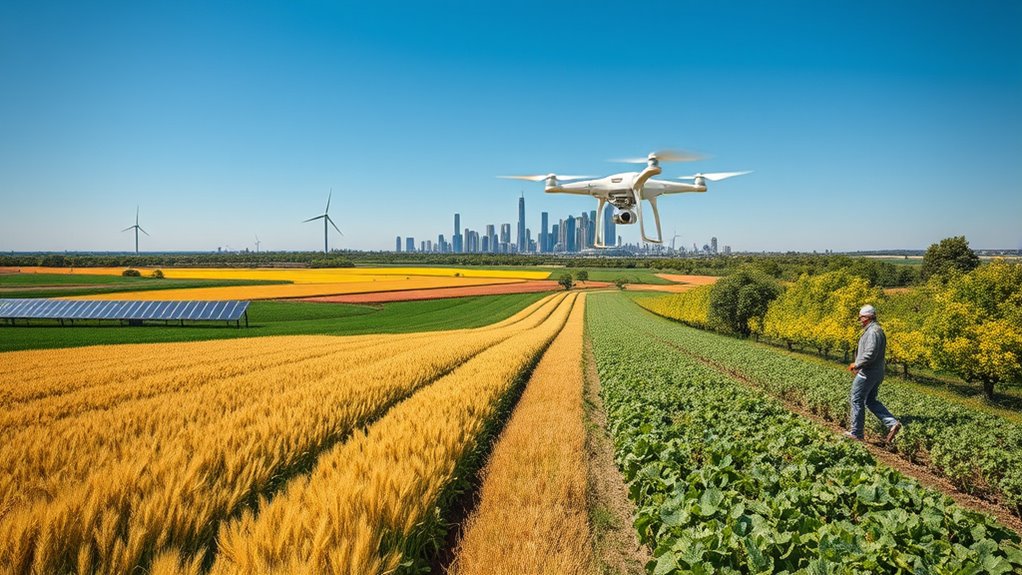
Ensuring food security and resilience is essential as the EU faces increasing climate challenges, market fluctuations, and demographic shifts. You need robust strategies to adapt to these changes and protect the food supply chain. This includes diversifying crops, investing in sustainable practices, and strengthening local food systems. By doing so, you help reduce dependency on imports and enhance resilience to global disruptions. Collaboration across regions and sectors becomes vital to share knowledge, resources, and innovations. Building resilient infrastructure and promoting flexible farming methods ensure that food production can withstand shocks. Your role in supporting policies that prioritize sustainability and risk management is crucial to maintaining a stable, secure food future for all. Understanding the importance of a Gold IRA can also contribute to financial resilience and diversification.
Supporting Farmers and Rural Communities
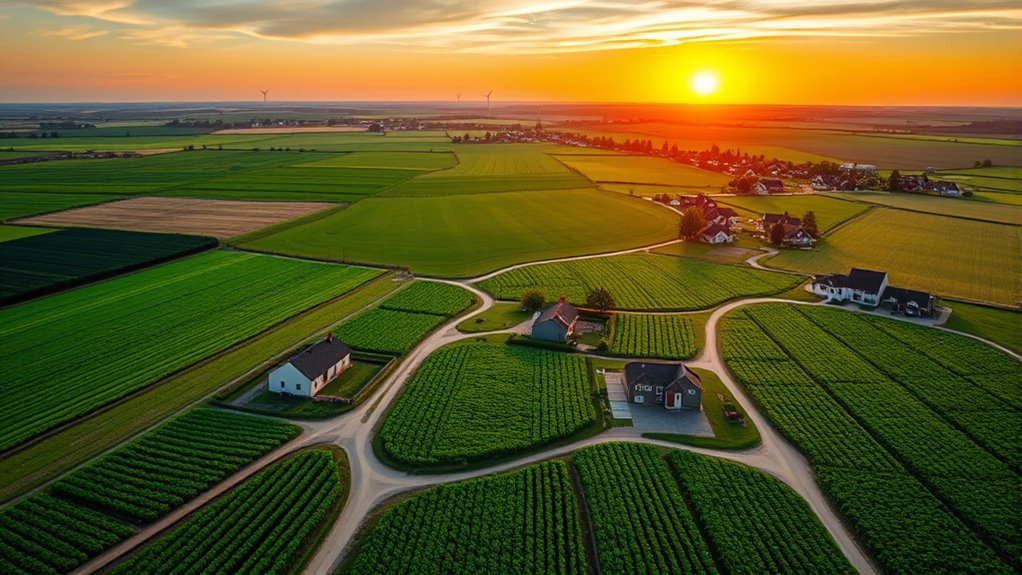
Supporting farmers and rural communities is vital for a thriving agricultural sector. By focusing on enhancing livelihoods and encouraging sustainable practices, you help build resilient and prosperous regions. These efforts guarantee a sustainable future for both producers and the environment. Promoting active listening and empathy within communities further strengthens social cohesion and collaborative efforts toward common goals.
Enhancing Rural Livelihoods
To truly enhance rural livelihoods, the EU must focus on empowering farmers and rural communities through innovative practices and accessible resources. You can support this by fostering local entrepreneurship, improving access to modern technology, and providing targeted financial aid. Strengthening infrastructure like roads and digital connectivity boosts market access and reduces isolation. Encouraging diversification helps farmers stabilize income and adapt to changing conditions. Additionally, investing in education and training equips communities with skills needed for modern agriculture and small business development. These measures ensure rural areas remain vibrant and resilient, offering better opportunities for residents. For example, integrating home furnishings solutions like modern furniture and safety features can improve living standards and comfort. By prioritizing these strategies, the EU creates a foundation where rural communities can thrive economically and socially.
Promoting Sustainable Practices
Promoting sustainable practices is crucial for safeguarding the environment while maintaining productive agriculture and resilient rural communities. You can adopt innovative farming methods that reduce chemical use, conserve water, and enhance soil health. Supporting farmers through training and access to eco-friendly technology helps them implement these practices effectively. Incentives such as grants or subsidies encourage sustainable investments. By prioritizing biodiversity and reducing emissions, you contribute to climate resilience. Encouraging local food systems and short supply chains strengthens rural economies and reduces environmental impact. Your role in adopting and promoting sustainable practices helps create a resilient, environmentally friendly agricultural sector. Together, these efforts ensure food security, protect natural resources, and support the long-term vitality of rural communities.
Policy Frameworks and International Cooperation
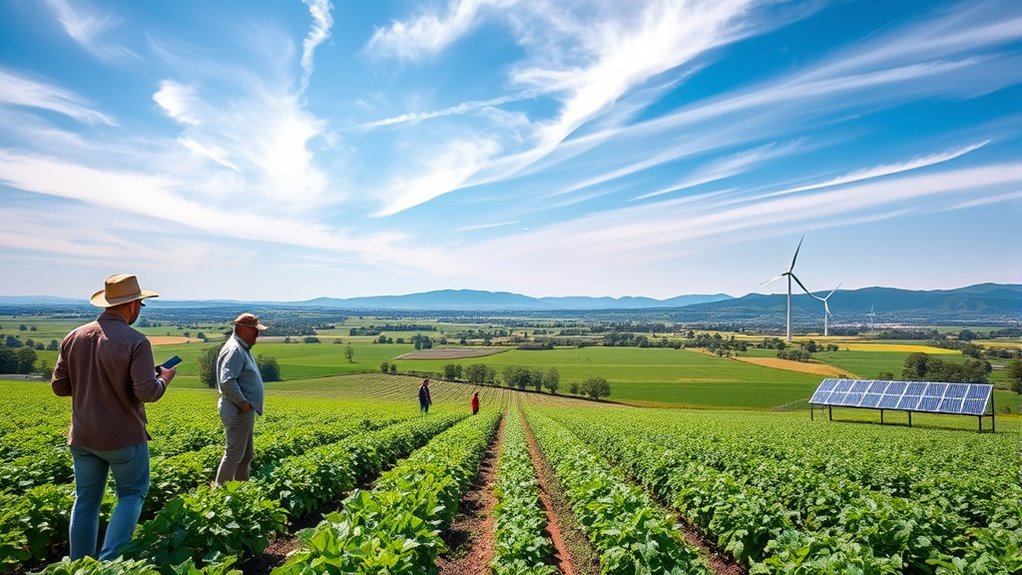
Effective policy frameworks and international cooperation are essential for shaping the future of EU agriculture and food systems. They guarantee alignment across borders, promote sustainable practices, and support innovation. Strong policies create a stable environment for farmers and producers, guiding investments and research. International cooperation helps address global challenges like climate change, trade barriers, and food security. By working together, the EU and partner countries can share knowledge, standards, and technologies. This collaboration fosters resilience and competitiveness in the global market. Your role involves understanding these frameworks and advocating for policies that prioritize sustainability, fairness, and innovation. High refresh rates in projectors enhance gaming experiences, making them a key feature for gaming enthusiasts.
Frequently Asked Questions
How Will Climate Change Impact EU Agricultural Policies by 2040?
Climate change will markedly shape EU agricultural policies by 2040, prompting you to prioritize sustainability and resilience. You’ll see increased emphasis on reducing greenhouse gas emissions, adopting climate-smart practices, and supporting innovation. Policies might also encourage water conservation, biodiversity, and renewable energy use. You’ll need to adapt to changing weather patterns, ensuring food security while protecting the environment, ultimately making EU agriculture more sustainable and resilient against future climate challenges.
What Measures Will Ensure Fair Income for Farmers Under the New Vision?
You’ll find that fair income for farmers is prioritized through measures like direct payments, which currently support 80% of farm income in some regions. Under the new vision, policies aim to boost sustainability and resilience, ensuring farmers earn a fair share. You’ll see investments in innovation, eco-friendly practices, and market access, helping farmers adapt to climate change and secure stable incomes amid evolving agricultural landscapes.
How Will Urbanization Influence Rural Development Strategies in 2040?
Urbanization will considerably shape rural development strategies in 2040 by encouraging the integration of smart infrastructure and digital technologies. You’ll see more focus on connecting rural areas to urban markets, enhancing access to services, and promoting sustainable land use. This shift will also inspire you to adopt innovative practices, foster local entrepreneurship, and strengthen community resilience, ensuring rural regions thrive amid growing urban centers.
What Are the Potential Risks of Technological Reliance in Agriculture?
You might think relying heavily on technology in agriculture is a game-changer, but it comes with risks. Overdependence can lead to vulnerabilities if systems fail or get hacked, threatening food security. You could also face increased costs, making small farms less competitive. Additionally, there’s the risk of eroding traditional knowledge and biodiversity. While tech offers benefits, balancing innovation with caution keeps your farming sustainable and resilient.
How Does the EU Plan to Address Global Food Demand Growth?
The EU plans to address global food demand growth by promoting sustainable agriculture practices, investing in innovative technologies, and supporting farmers through research and development. You’ll see efforts to boost productivity while minimizing environmental impacts, ensuring food security for future generations. Emphasizing biodiversity, circular economy, and climate resilience, the EU aims to create a resilient food system that can effectively meet rising global needs.
Conclusion
By 2040, your role in shaping the EU’s agricultural future is like steering a ship through uncharted waters—navigating innovation, sustainability, and resilience. Embrace new technologies, support rural communities, and champion circular practices to guarantee the journey leads to fertile, thriving lands. Together, you can weave a resilient tapestry where food security and environmental health coexist, guiding Europe toward a sustainable, bountiful horizon that benefits all.

